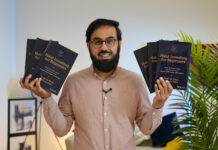Zafer Iqbal says Rageh Omaar’s BBC series about the Ottomans was fairly positive for once although it did repeat some tired revisionist stereotypes.
“On the edge of Europe is a city that was once the heart of a mighty empire. From here in Istanbul, the glories of the Ottoman Empire came to match those of ancient Rome.
“For 600 years, from the Middle Ages to the 20th century, one dynasty of Ottoman sultans, a single family, ruled over huge swathes of the world. The Ottomans were staggeringly wealthy… an empire of a million square miles… a superpower.”
So dramatically began Rageh Omaar’s latest documentary – “The Ottomans: Europe’s Muslim Emperors” appearing on the BBC on Sunday evening.
The opening presented a vista of Ottoman symbols, institutions and imagery. Breathtaking shots of the vast lands the Ottomans once controlled, halcyonic imagery of architecture, art and culture reflecting a deep faith in the divine, imposing portraits and photos of powerful bygone Sultans, projecting the power and majesty of an advanced and dynamic civilisation.
Subscribe to our newsletter and stay updated on the latest news and updates from around the Muslim world!
It was an awe-inspiring introduction to a series that promised to explain why the Ottomans had vanished from our understanding of European history and why it is rekindling global interest.
Ottoman origins
Omaar situated the Ottoman story in fourteenth century rural Anatolia. Fighting as mercenaries for Muslim rulers, the tribes had embraced Islam and settled in Sogut, competing with rival tribes for survival.
Osman emerged as the founding father of the Ottomans, famed for a legendary dream indicating his descendants would become rulers. As a Turkish frontier principality facing a crumbling Christian empire, Osman defeated a Byzantine imperial army, resulting in many tribes joining him.
With the young 21-year-old Mehmed II conquering Constantinople in 1453, 150 years after Osman’s first victory, the Ottoman military ended over a thousand years of Christian rule and began their conquest of Europe, reaching deep into its territories over the following centuries.
Failings of the documentary
Whilst attempting to present events impartially, the documentary successfully conveyed the broad strokes of Ottoman origins. However, Omaar sadly failed to exclude modern paradigms from the narrative, decontextualising many historic events, leaving the viewer considering some Ottoman practices as unusual if not barbaric; the paternalistic devshirme system being an example.
Ottoman Sultans were portrayed as disinterested and distant from Islam, with little reflection of the fundamental role Islam played in the Ottoman civilisation. Recounting the conquest of Constantinople, Omaar glossed over the religious background of Mehmed II, the impetus in his imperative of fulfilling an Islamic duty (and prophecy) to conquer Constantinople.

Joseph Schacht, the Orientalist legal scholar, argued the Ottomans assumed Islam seriously from the onset. Ottomanist Suleyman Bolay’s research shows how they traced their lineage back to the Prophet Nuh (as), believing their mission was to convey Islam around the world, save the Islamic state from weakening, prevent Islam and Muslims from being harmed, and blocking harm from the infidels.
All Ottoman Sultans had this embedded in their ideational outlooks, with the piety of many Sultans including Mehmed II, Suleiman, Mahmud II and Abdul Hamid II standing out.
The early Sultan Orhun, on taking power, suggested sharing the state with his brother Alaeddin – who refused, not wanting political division. Orhan told him, “Since, my brother, thou will not take the flocks and the herds that I offer thee, be thou the shepherd of my people; be my Vizier”. Alaeddin accepted and helped organise the early Ottoman state, including the creation of the first standing Muslim army, a century before Charles VII did the same in France.
Collapse of the Ottomans
Omaar’s research appeared a little lacking at times, unconsciously reproducing a number of myths and propaganda that have been vanquished by recent scholarship. He narrated the Ottomans were “the world’s last Islamic empire and collapsed less than a hundred years ago”.

Describing the Ottoman state as collapsing perpetuates the narrative that the Ottoman state was the “sick man of Europe” suffering an indubitable decline leading to an inevitable collapse. The erroneous implication being systems of governance had failed, unable to address modernity. This teleological narrative was repeated ad-nauseum post-Ottoman demise.
The cause of the Ottoman demise had in fact been multiple attacks on many fronts by rapacious European states, their treacherous Arab tribes and troops from their colonies during WWI before it was torn to pieces.
The Ottomanist scholar, Faroqhi cites scholars who realised with the commencement of studies of deregulated Ottoman archives in 1988, overlooked details as well as major generalisations would need to be modified or even discarded saying, “Some errors may be just amusing, such as the story that the heads of the Ottoman religious-cum-legal hierarchy, the seyhulislams, if executed, were ground to death in a gigantic mortar and pestle…Others are more serious and have much hampered research, such as the inclination to explain anything and everything by Ottoman decline”.
Revisionist history
Interviewing the mayor of Greek Macedonia, Omaar is told of their fear of the Ottomans. Imagery of Ottomans razing cities to the ground is questioned by Omaar through research of ancient Ottoman remains, hammams (bathing structures), which have remained dotted across Eastern European territories six centuries later.
Omaar didn’t appear to realise that much of the demonisation of the Ottomans and the blackening of their history began with revisionist historians after the demise of the Ottomans in 1924. It permeated through nationalist education systems, with many works being vacuous, based on suspect sources and heavily biased.
Donald Quataert, a leading American Ottomanist, says “Given the nationalist logic of the nineteenth- and twentieth-century history writing, the Ottoman legacy has been difficult to assess and appreciate. The biases come from many sides… In more than thirty countries that now exist in territories once occupied by the Ottoman Empire, the Ottoman past until recently has been largely ignored and/or considered in extremely negative terms”.
It will be interesting to see how Rageh Omaar deals with the rest of their history in the remaining two episodes – overall a fairly good start to the series considering it’s a BBC production!
Zafer Iqbal will be giving his overview throughout Rageh Omaar’s history of Ottoman series.




















